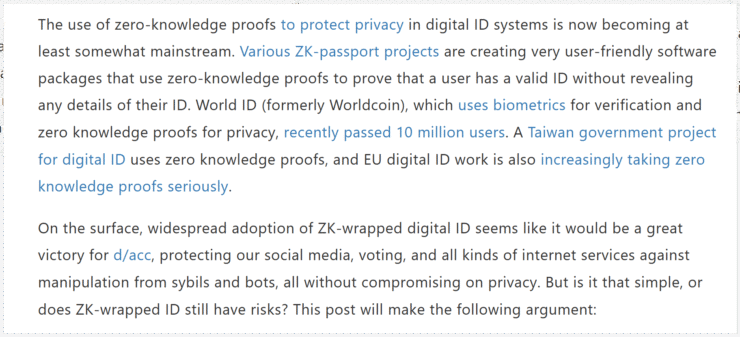Ethereum co-founder Vitalik Buterin has laid out a detailed critique of emerging digital identity systems, cautioning that even zero-knowledge (ZK) proof-based credentials may fail to protect core privacy principles if implemented too narrowly.
In a blog post published Sunday, Buterin introduced the idea of pluralistic identity—a framework designed to prevent any one institution or technology from dominating how people prove who they are online.
While zero-knowledge proofs—cryptographic tools that let users confirm facts without disclosing personal information—have become a cornerstone of next-generation identity systems like World ID and Taiwan’s national ID project, Buterin warned that privacy risks remain if platforms tie individuals to a single, universal identifier.
“ZK-wrapping solves a lot of important problems,” he wrote.
“But ZK-wrapped ID still has risks,” noting that rigid one-person-one-ID systems could erode the freedom to separate online personas and enable coercive surveillance.

One-Size-Fits-All IDs Threaten Pseudonymity
Buterin argued that requiring all users to link their activities to a single identity would effectively kill pseudonymity—the ability to maintain separate profiles for work, activism, or private life.
“In the real world, pseudonymity generally requires having multiple accounts,” he explained, underscoring that this separation shields individuals from overreach by employers, governments, or corporations.
He also criticized anti-Sybil measures that rely solely on “proof of wealth”—where users must lock up large sums to validate an identity—as a tool that risks entrenching inequality.
“The theoretical ideal is something in the middle,” Buterin wrote, “where you can get N identities at a cost of N².” This approach, he argued, would balance resistance to fake identities without concentrating power exclusively among the rich.
Buterin’s comments come as governments and platforms rush to build digital ID systems that promise efficiency and security but often sidestep deeper questions about autonomy and power.
The Case for Pluralistic Identity
As a solution, Buterin proposed pluralistic identity, in which no single entity has monopoly control over credentialing or verification.
He outlined several paths to achieve this flexibility:
- Explicit pluralism, such as Circles UBI, where trust is anchored in social-graph relationships.
- Implicit pluralism, combining different types of IDs—like passports, social media accounts, and civic credentials—so no system can dominate.
“Any form of pluralistic identity… is naturally more error-tolerant,” he said. This model, he added, is better suited to supporting stateless people, migrants, or those excluded from traditional banking and government systems.
Buterin warned that if any single one-per-person ID network ever captured near-total market share, it would inevitably push society toward an ecosystem of pervasive tracking.
“If their market share gets too close to 100%, they shift the world… to a one-per-person model, which has worse properties,” he cautioned.
Ultimately, he called for blending universal ID mechanisms with decentralized social-graph verification to build systems that are resilient, inclusive, and resistant to abuse.
Quick Facts
- Vitalik Buterin argues single digital IDs—even with zero-knowledge proofs—could threaten user privacy and pseudonymity.
- He proposes pluralistic identity frameworks relying on multiple verification sources to avoid centralization.
- Buterin criticized proof-of-wealth models for entrenching power among the wealthy.
- The Ethereum co-founder said pluralistic IDs balance security, inclusion, and resistance to surveillance.





